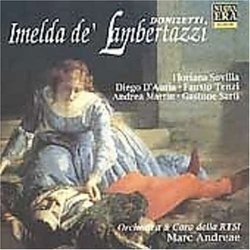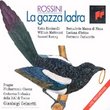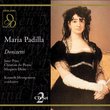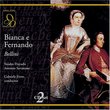| All Artists: Gaetano Donizetti, Marc Andreae, Orchestra E Coro Della RCA Italiana, Andrea Martin, Floriana Sovilla, Diego D'Auria, Fausto Tenzi, Gastone Sarti Title: Donizetti: Imelda de' Lambertazzi Members Wishing: 0 Total Copies: 0 Label: Nuova Era Release Date: 3/4/1993 Album Type: Import Genre: Classical Style: Opera & Classical Vocal Number of Discs: 2 SwapaCD Credits: 2 UPC: 715702677824 |
Search - Gaetano Donizetti, Marc Andreae, Orchestra E Coro Della RCA Italiana :: Donizetti: Imelda de' Lambertazzi
 | Gaetano Donizetti, Marc Andreae, Orchestra E Coro Della RCA Italiana Donizetti: Imelda de' Lambertazzi Genre: Classical
|
Larger Image |
CD DetailsSimilar CDs |
CD ReviewsEnthusiastically Recommended dwadefoley | New York, New York United States | 05/08/2000 (4 out of 5 stars) "We may be conditioned to think that the mature Donizetti emerged with Anna Bolena, but Imelda de' Lambertazzi calls this assessment into question. Often mentioned as the first of Donizetti's tragedies to feature an onstage death, Imelda otherwise gets little attention from commentators, and a very slender 19th century performance history suggests that perhaps it merits the oblivion into which it has fallen. Yet I can honestly say that no Donizetti opera has surprised me as much as this one has in terms of how forward-looking it is. Life for Imelda and Bonifacio, the lovers in this opera, is nasty, brutish, and short. A Romeo-and-Juliet plotline features a mezzo-baritone(!) couple whose downfall is assured by the bloodthirsty feud between their Guelph and Ghibelline families. Bonifacio is in the end stabbed by Imelda's brother with a poisoned dagger. She, in an attempt to save him, sucks the poison from his wounds and herself succumbs in front of her implacable and unmoved father and brother. The opera is brief, only just over 2 hours long. The drama moves swiftly and violently to its conclusion, and almost foreshadows the verismo works of the late 19th century in this and other respects. Musically, there is much that is unexpected. A martial trio for 3 male solo voices and chorus distinguishes the first act. Also notable are a dramatic entrance aria for Imelda (later used for Eleonora in Il Furioso) and a big ensemble to end the act. The final scene is particularly dramatic, with almost no breaks between musical numbers, the orchestra bridging them with interludes and thereby giving a sense that we are rushing headlong towards the tragic conclusion. Especially moving is Imelda's final aria, which is not a display piece as we would expect, but rather a slow and brief solo with intensely moving cello obliggato. The opera ends with a hushed whisper of horror from the assembled crowd as Imelda expires at the feet of her unfeeling father. Sustained string tremolos underly the final chords. The effect is chilling and very dramatic. A listen to this recording makes one suspect that Imelda did not succeed precisely because it so radically departed from the precedent set 3 years earlier by Bellini in Il Pirata, a formula that Donizetti would return to in most of his subsequent music dramas. The singers, although all unknown, sing competently if not better, and the conducting is vigorous. One could wish for a better chorus, but in a recording of an unknown opera, one can't have everything. The sound is good. Imelda is an opera that an adventurous company would do well to consider for a stage production." Interesting Donizetti adequately performed John Cragg | Delta(greater Vancouver), B.C Canada | 10/15/2000 (4 out of 5 stars) "Donizetti wrote a great many good, but not outstanding, operas. Their sheer numbers may be why so many have dropped out of sight. This is one of them, a well-crafted work with nothing much to separate it from many other well-crafted works. The libretto, on a theme of romantic tragedy arising from warring families, maintains interest without stretching credulity too far. Imelda is one of four Donizetti operas produced in 1830 - and another three were composed in the following year. It was not Verdi who really spent time in the galleys! Imelda has no blockbuster pieces, but it does have a great deal of interesting music, some of which is quite forward looking and not just routine Donizetti. (While it is common to say that this "anticipates" Verdi, it is more accurate to say that Verdi copied the spirit of much of Donizetti and other composers of the 1830's and 1840's.) Thus, if you enjoy mid 19th century opera, Imelda de' Lambertazzi is among the many Donizetti operas that are highly satisfying. One wishes that minor opera companies would stage this or similarly obscure works rather than present, yet again, standard war horses for which better productions are available widely on disc or video. The music is more friendly to second-rate voices than much of the standard repertoire. This recording made over several performances, apparently of a concert rather than a staged version, does a good job of presenting the opera. Done to a scholarly score, it sounds to be just the music as written, without much ornamentation, which probably was to be introduced by the performers. The role of Imelda here is primarily one for a dramatic soprano, not too taxing on the voice though some of the music is in the range where mezzos are more at ease than sopranos. Floriana Sovilla handles it very well. The lover in this opera is a baritone, adequately sung by Andrea Martin, and the two tenor roles - the father and brother of the unfortunate Imelda --are adequately handled by Diego D'Auria and Fausto Tenzi, without anything very striking happening. The conducting of a good orchestra and chorus by Marc Andreae is also quite acceptable while the recording engineering is better than one might expect.This demonstrates very well how much interest and pleasure non-star performers in almost unknown works can generate. All together, this is an interesting and enjoyable piece, well worth adding to a collection if this sort of opera appeals to one."
|

 Track Listings (17) - Disc #1
Track Listings (17) - Disc #1

